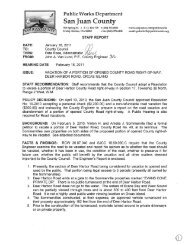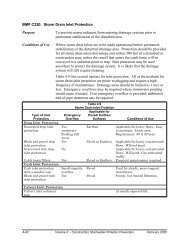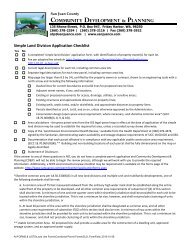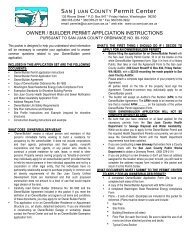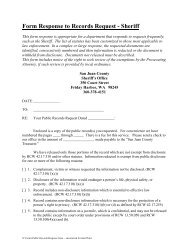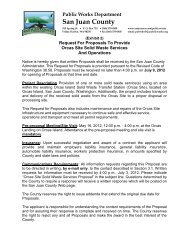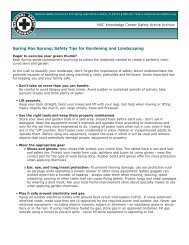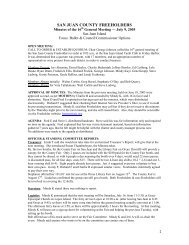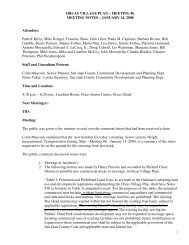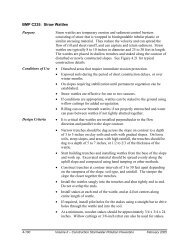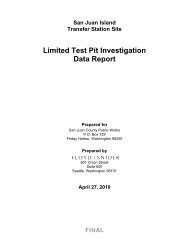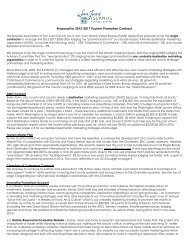Ordinance No._____- 2012 AN ORDINANCE ... - San Juan County
Ordinance No._____- 2012 AN ORDINANCE ... - San Juan County
Ordinance No._____- 2012 AN ORDINANCE ... - San Juan County
Create successful ePaper yourself
Turn your PDF publications into a flip-book with our unique Google optimized e-Paper software.
Page 21 of 56<br />
Ord. ____-<strong>2012</strong><br />
“<strong>No</strong>npoint source” means the release of waste or other flows which occurs over a broad or undefined area.<br />
Releases which can be described as confined to a small area, such as discharges from a pipe or conduit, are<br />
referred to as “point-source discharges.” (See also “point-source discharge.”)<br />
“<strong>No</strong>rmal appurtenance, shoreline” means a structure or development that is necessarily connected to the use and<br />
enjoyment of a single-family residence and which is expressly defined in WAC 173-27-040 and in Chapter 18.50<br />
SJCC, for purposes of exemption from shoreline substantial development permit requirements in accordance with<br />
WAC 173-27-040(g). (See also “shoreline exemption.”)<br />
“Nursery” means lands or greenhouses used to raise flowers, shrubs, and plants for commercial purposes.<br />
“Nursing home (long-term health care facility)” means a facility or residence that provides health or long-term<br />
care services to residents, including nursing or other supportive or restorative health services on a 24-hour basis<br />
(RCW 43.190.020).<br />
SECTION 7. SJCC 18.20.170 and Ord. 2-1998 Exh. B § 2.3 are each amended to read as follows:<br />
18.20.170 “Q” definitions.<br />
“Qualified professional” means a person with training and experience in the pertinent scientific discipline. With<br />
regard to Critical Areas, it means a person who is a qualified scientific expert in accordance with WAC 365-195-<br />
905. A qualified professional must be licensed and/or certified where such licensing or certification are required.<br />
When certification is not required the professional must have: (1) obtained a B.S., B.A., or equivalent degree in<br />
biology, engineering, environmental studies, fisheries, geomorphology, or related field, and (2) have at least five<br />
years of related work experience.<br />
1. Wetlands. A qualified wetlands professional is a person who has an understanding of hydrology and<br />
advanced skills in plant identification and soils classification, has been trained in the procedures of the<br />
1987 (federal) Wetland Delineation Manual and its updated Regional Supplement, has used those<br />
procedures to delineate a wetland, has obtained permits from the Washington State Department of<br />
Ecology or the U.S. Army Corps of Engineers within the last seven years, and has the qualifications to<br />
conduct wetland studies and make recommendations for wetland mitigation. These qualifications include<br />
specialization in wetland soils, botany, or hydrology, with appropriate education and experience.<br />
2. Fish and Wildlife Habitat Conservation Areas. A qualified professional for habitat must have a degree in<br />
biology or a related degree and professional experience related to the subject species.<br />
3. Geologically Hazardous Areas. A qualified professional for a geological hazard is: (1) a geotechnical<br />
engineer, qualified civil engineer, or certified engineering geologist; (2) with experience analyzing<br />
geologic, hydrologic, and ground water flow systems and slope stability, seismicity, faulting and<br />
liquefaction; and (3) is licensed to practice in the state of Washington. When the proposed development<br />
is located in an area subject to coastal geomorphological processes, the professional shall have<br />
demonstrated experience in evaluating and providing technical recommendations related to sediment and<br />
sediment transport, and effects on property and shoreline stability.<br />
4. Critical Aquifer Recharge Areas. A qualified professional for critical aquifer recharge areas means a<br />
hydrogeologist, geologist, engineer, or other scientist with experience in preparing hydrogeological<br />
assessments.<br />
“Qualified wetlands consultant” means a person who has the qualifications to conduct wetland studies and make<br />
recommendations for wetland mitigation. These qualifications include specialization in wetland biology, botany,<br />
and hydrology, with appropriate education and experience.<br />
N:\L<strong>AN</strong>D USE\LONG R<strong>AN</strong>GE PROJECTS\PCODES-11-0004 CAO FWHCAs\Docs from PC and CC\FWHCAOrdCC_<strong>2012</strong>-10-26.doc



